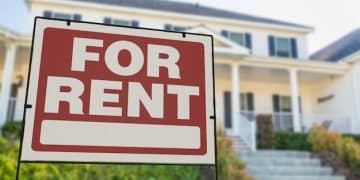Understanding Your Lease Agreement: Key Clauses & Responsibilities

Understanding Your Lease Agreement: Key Clauses and Tenant Responsibilities involves carefully reviewing every section of the document to ensure you comprehend your rights and obligations as a tenant, including rent payment terms, maintenance responsibilities, and lease termination conditions.
Navigating the world of rental agreements can often feel overwhelming, especially when faced with lengthy legal documents filled with complex jargon. Understanding Your Lease Agreement: Key Clauses and Tenant Responsibilities is crucial for protecting your rights and ensuring a smooth and stress-free tenancy.
Decoding Your Lease Agreement: A Comprehensive Guide
A lease agreement is a legally binding contract that outlines the terms and conditions of renting a property. It’s essential to understand every clause before signing, as it governs your rights and responsibilities as a tenant. Failing to do so could lead to misunderstandings, disputes, and even legal issues down the line.
Why is a Lease Agreement Important?
A lease agreement provides clarity and protection for both the landlord and the tenant. It clearly defines the rental period, rent amount, payment schedule, and other important details. It also outlines the responsibilities of each party, such as who is responsible for maintenance and repairs.
- Provides a clear framework for the tenancy relationship.
- Protects both the landlord and the tenant.
- Helps to avoid misunderstandings and disputes.

Understanding the components of a lease agreement is the first step towards a successful tenancy. The agreement will normally set the time frame of the contract, which may be indefinite but will usually be for a fixed annual or multi-year term. A lease is normally automatically extended on a year-by-year basis unless one of the parties notifies the other of the desire to terminate.
Key Clauses to Look For in Your Lease
Lease agreements often contain numerous clauses, some of which are more important than others. Understanding these key clauses will empower you to protect your rights and avoid potential pitfalls.
Rent and Payment Terms
This clause specifies the amount of rent you’ll pay, the due date, and acceptable methods of payment. Pay attention to late fee policies and any grace periods.
Security Deposit
This section outlines the amount of the security deposit, how it can be used, and the conditions for its return. Make sure you understand your rights regarding the security deposit, as well as what conditions trigger forfeiture of the deposit.
- Amount of the security deposit.
- Acceptable uses of the security deposit (e.g., repairs for damage beyond reasonable wear and tear).
- Conditions for the return of the security deposit, including deadlines.
Beyond the essential financial terms like rent and security deposits, leases will also include the rules of the property. Typically, these are to ensure that other tenants can enjoy their premises in peace and without undue disturbance, as well as to ensure that the physical integrity of the property isn’t affected.
Understanding Your Maintenance Responsibilities
Most lease agreements outline the tenant’s and landlord’s responsibilities for maintaining the property. It’s crucial to know who is responsible for what to avoid potential disputes. Typically speaking, landlords are responsible for capital improvements, such as replacing the roof or HVAC systems. However, this is something that the lease should confirm.
Tenant Responsibilities
Tenants are generally responsible for maintaining the cleanliness of the property, preventing damage, and reporting any maintenance issues to the landlord promptly. The lease may specify certain things that are considered the tenants’ responsibility.
Landlord Responsibilities
Landlords are typically responsible for major repairs, structural maintenance, and ensuring the property is habitable. Knowing what is considered a landlord versus tenant responsibility saves both parties time and frustration.

Understanding the maintenance responsibilities is key to preventing conflicts during the lease term. Be sure to carefully review the lease and clarify any ambiguities with the landlord before signing.
Lease Termination: Knowing Your Rights
Lease agreements typically specify conditions that allow for early termination of the lease. It is important to understand those conditions before entering into the lease. Some situations permit early termination without penalty, while others may require you to pay a fee or find a new tenant. In general, there are some protections for tenants to terminate a lease early because of active duty military relocation.
Early Termination Clauses
Some leases include clauses that allow you to terminate the lease early under certain circumstances, such as job loss or relocation. Understanding the terms of these clauses is essential. These clauses may include a fee to be paid, or certain conditions to be met, such as the tenant finding a replacement tenant.
Eviction Procedures
Landlords must follow specific legal procedures to evict a tenant. Knowing your rights during the eviction process is crucial to protecting yourself, so it is wise to review this section of the lease.
- Legal grounds for eviction (e.g., non-payment of rent, violation of lease terms).
- Required notice period before eviction proceedings begin.
- Tenant’s rights during the eviction process.
Lease termination is an essential aspect of any lease agreement. Understanding the conditions for early termination and knowing your rights during eviction can help you navigate potential challenges.
Negotiating Lease Terms: What’s Possible?
While many lease agreements may seem non-negotiable, some terms can often be modified or negotiated with the landlord. Knowing what’s possible to negotiate can help you secure a lease that better suits your needs. It’s unusual, but sometimes the landlord is eager to complete a deal with a well-qualified tenant, and may offer concessions in order to do so.
Commonly Negotiated Terms
Some common terms that tenants often negotiate include rent amount, lease duration, pet policies, and maintenance responsibilities. Landlords may be open to modifying these terms, especially if you have a strong rental history and credit score.
How to Approach Negotiations
When negotiating lease terms, it’s essential to be polite, respectful, and well-prepared. Research fair market rents in your area and be ready to justify your requests. Presenting your case clearly and reasonably increases your chances of success.
Negotiating lease terms can be a valuable opportunity to tailor the agreement to your specific needs. Approach negotiations with a clear understanding of your priorities and a willingness to compromise.
Legal Considerations and Resources
Lease agreements are governed by state and local laws, which can vary significantly. It’s important to be aware of the legal landscape in your area and to know where to find resources if you need assistance.
State and Local Laws
Research the landlord-tenant laws in your state and city to understand your rights and obligations. Many states have specific laws regarding security deposits, eviction procedures, and landlord access to the property.
Resources for Tenants
Numerous resources are available to help tenants understand their rights and navigate lease agreements. These resources include tenant advocacy groups, legal aid societies, and government agencies.
- Tenant advocacy groups.
- Legal aid societies.
- Government agencies.
Understanding the legal considerations surrounding lease agreements is crucial for protecting your rights. Utilize available resources to educate yourself and seek assistance when needed.
| Key Point | Brief Description |
|---|---|
| 🔑 Key Clauses | Understand crucial clauses like rent, security deposit, and maintenance. |
| 🛠️ Maintenance | Know who’s responsible for repairs to prevent disputes. |
| 🚪 Termination | Be aware of early termination conditions and eviction procedures. |
| ⚖️ Negotiation | Some lease terms can be negotiated with the landlord. |
Frequently Asked Questions (FAQs)
▼
Reasonable wear and tear refers to the normal deterioration of the property over time due to ordinary use. It doesn’t include damage caused by negligence or misuse, such as broken appliances or holes in the wall. Landlords cannot deduct normal wear and tear from the security deposit.
▼
In most cases, a landlord must provide reasonable notice before entering your apartment, except in emergencies. The specific notice period may vary depending on your state and local laws. Consult your lease agreement for specific details on permissible entry.
▼
If your landlord fails to make necessary repairs, you may have legal options, such as withholding rent (in some states), repairing the issue yourself and deducting the cost from your rent, or terminating the lease. Seek legal advice before taking action.
▼
Generally, a landlord cannot raise the rent during the lease term unless the lease agreement specifically allows it. If you have a fixed-term lease, the rent amount is typically locked in for the duration of the lease. Any notice of lease termination will usually set out the new rental rate at that time.
▼
If you have a dispute with your landlord, try to resolve it amicably through communication. If that’s not possible, consider seeking mediation or legal advice. Document all communications and keep records of any relevant evidence in case legal action becomes necessary.
Conclusion
Understanding your lease agreement is paramount to a successful and stress-free tenancy. By carefully reviewing the key clauses, knowing your rights and responsibilities, and seeking assistance when needed, you can protect yourself and ensure a positive renting experience.





